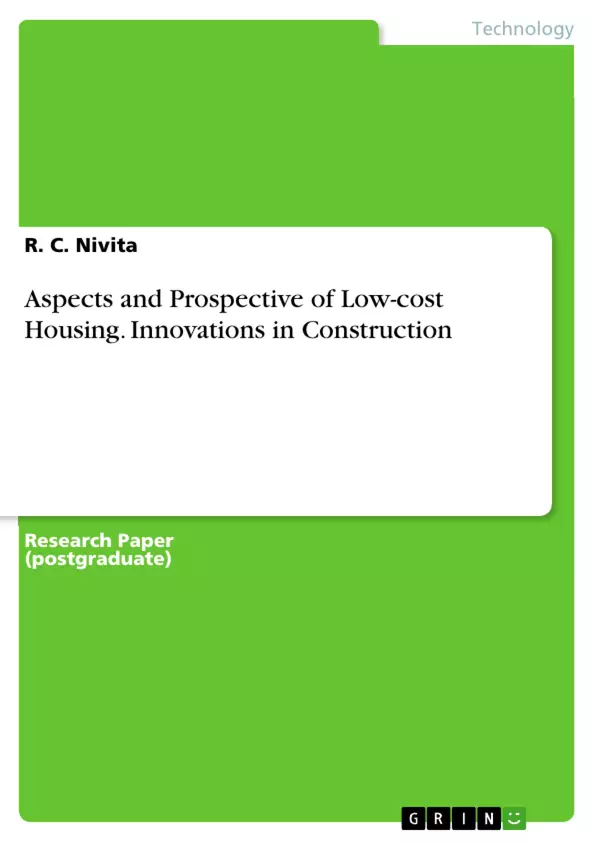The issue of extending credit to low-income individuals and impoverished communities who are considered non-bankable is a significant global concern, especially in developing countries. This paper examines the challenges faced by the informal sector, which lacks reliable employment records and monthly income, in securing loans and mortgages due to limited access to land and tenure. The high interest rates offered by local money lenders, ranging from 36% to 20%, pose a burden on the target demographic, requiring low-interest funds and housing cost subsidies. Implementing novel construction methodologies is crucial for cost efficiency. However, the successful adoption of emerging technologies presents obstacles related to awareness, appreciation, and effective implementation. Technology transfer plays a vital role in training personnel, producing components, and providing guidance for the utilization of emerging technologies in housing. The impact of the Indian Building Centre movement is documented, emphasizing the integration of inclusionary measures into local codes, specifications, and procedures to support affordable housing. Government housing policies offer a framework for acquiring resources such as land, finance, materials, and technologies. Reforms focus on enhancing financial stability, expediting approval procedures, and simplifying land and property registration processes. Housing for All programs address the needs of different socio-economic strata through Luxury, Premium, and Affordable Housing options. The effective implementation of Early Warning Systems and National Implementation Guidelines requires financial incentives like subsidies, affordable finance, and access to cost-effective technologies. Social housing allocation is crucial for the lower socio-economic strata.
Inhaltsverzeichnis (Table of Contents)
- Abstract
- Introduction
- Aspects for Low-cost housing
- Policies for Low-cost housing
Zielsetzung und Themenschwerpunkte (Objectives and Key Themes)
This paper examines the challenges faced by low-income individuals in accessing affordable housing in developing countries, particularly the informal sector. It highlights the need for low-interest funds, cost-effective construction methodologies, and government support in the form of housing policies and financial incentives. The paper explores the potential of emerging technologies and technology transfer, and investigates the impact of the Indian Building Centre movement on affordable housing initiatives. It also delves into the complexities of eviction practices and the role of public rental housing in providing sustainable solutions for low-income households.
- Challenges of accessing affordable housing for low-income individuals
- Role of government policies and financial incentives in promoting affordable housing
- Potential of emerging technologies and technology transfer in construction
- Impact of the Indian Building Centre movement on affordable housing
- Complexities of eviction practices and the role of public rental housing
Zusammenfassung der Kapitel (Chapter Summaries)
-
Abstract
This section provides a concise overview of the paper's focus on extending credit to low-income individuals, highlighting the challenges faced by the informal sector in accessing loans and mortgages due to limited access to land and employment records. It emphasizes the need for low-interest funds, cost-effective construction methodologies, and government housing policies to address the issue of affordable housing. -
Introduction
This chapter delves deeper into the challenges faced by low-income individuals in securing housing, emphasizing the high interest rates charged by local lenders and the lack of affordable housing options. It underscores the importance of incorporating innovative construction methodologies, promoting technology transfer, and leveraging government support to ensure access to affordable housing for all. -
Aspects for Low-cost housing
This section explores various aspects of low-cost housing, highlighting the need for cost-effective technologies, affordable home loan options, and the potential of rental housing alternatives. It emphasizes the importance of well-executed leave and license systems, prefabricated construction techniques, and the transfer of public rental properties to social housing organisations. -
Policies for Low-cost housing
This chapter examines the impact of rapid urbanization and economic growth on the development of slums. It highlights the need for government intervention in addressing the issue of affordable housing through policies that promote inclusive housing development, land acquisition, and sustainable urban planning.
Schlüsselwörter (Keywords)
The primary keywords and focus topics of this text include: affordable housing, low-income individuals, informal sector, emerging technologies, technology transfer, government housing policies, social housing, eviction practices, public rental housing, urbanization, slums, sustainable urban planning.
Frequently Asked Questions
What are the main challenges for low-income housing in developing countries?
Key challenges include limited access to land, lack of formal employment records for securing mortgages, and high interest rates from local moneylenders.
How can emerging technologies help in affordable housing construction?
Technologies like prefabrication and novel construction methodologies can significantly increase cost efficiency and reduce the overall price of housing units.
What was the impact of the Indian Building Centre movement?
The movement promoted the use of cost-effective technologies and integrated inclusionary measures into local building codes to support affordable housing initiatives.
What role does government policy play in social housing?
Governments provide the framework for land acquisition, financial subsidies, and simplified registration processes, which are essential for "Housing for All" programs.
Why is public rental housing considered a sustainable solution?
Public rental housing offers a viable alternative for the informal sector who cannot afford ownership, provided there are effective leave and license systems in place.
- Arbeit zitieren
- R. C. Nivita (Autor:in), 2022, Aspects and Prospective of Low-cost Housing. Innovations in Construction, München, GRIN Verlag, https://www.hausarbeiten.de/document/1367900


